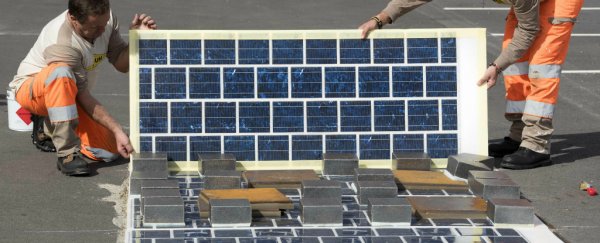France's government has announced plans to pave 1,000 km (621 miles) of road with durable photovoltaic panels over the next five years, with the goal of supplying renewable energy to 5 million people - around 8 percent of France's population.
The project is the result of five years of research between French road construction company, Colas, and the National Institute of Solar Energy. And although a lot of solar experts have been pretty vocal about the downfalls of 'solar freaking roadways' (they're expensive, potentially unsafe, and inefficient compared to regular rooftop panels), it's pretty incredible to see a government get behind new renewable energy technology in such a big way.
The French definitely aren't the first to embrace solar roads, though. Back in 2014, a US husband-and-wife team raised more than US$2million with their crowd-funding campaign to develop road-ready photovoltaic panels. And the Netherlands installed the first test-path using solar panels, which performed better than expected with light bike traffic.
But this will be the first time solar panels will be installed onto public roads, and the patented panel design, known as Wattway, is unique in that it can applied on top of existing roads, without having to rip up or reinstall any infrastructure.
Another benefit comes in the construction of the 15-cm photovoltaic panels, which are made of a thin film of polycrystalline silicon, coated in a resin substrate to make them stronger. The whole thing is just 7 mm thick. According to Colas, this unique, layered structure gives the panels a lot more grip than other solar road panels, and can reduce the risk of accidents for trucks and cars.
 Joachim Bertrand/COLAS
Joachim Bertrand/COLAS
"There is no need to rebuild infrastructure," Colas CEO Hervé Le Bouc told magazine Les Echoes last year, when the panels were unveiled. "At Chambéry and Grenoble, was tested successfully on Wattway a cycle of 1 million vehicles, or 20 years of normal traffic a road, and the surface does not move."
The panels are apparently also weather-proof - the silicon cells are safely encapsulated to keep them dry in the rain, and the material is so thin that it can adapt to thermal dilation in the pavement.
"The panels have even passed the snowplow test with flying colours," the Wattway site explains. "Operators do, however, need to operate the machines with a bit more care on Wattway panels than on conventional pavement."
Based on the assumption that roads are only covered by vehicles roughly 10 percent of the time - and during the rest of the sunny hours they'll be soaking up rays - the company estimates that 20 square metres of Wattway panels will provide enough electricity to power a single French home, excluding heating.
The plan to cover 1,000 km of existing road with these panels was announced this week at a press conference by Ségolène Royal, France's minister of ecology, sustainable development, and energy, as reported by Global Construction Review. There's no news yet as to which roads will be the first to receive the solar panels, and we'll have to wait and see how well they'll perform out in the field.
But there are still a lot of concerns that solar road concepts in general are never going to be cost effective, efficient, and safe enough to be a real contender in the renewable energy game - especially when stacked up against regular rooftop panels.
"Where solar is cost effective, it is: well set up (orientation, shading, ventilation, and so on), not required to be a structural element (hence a standard module is sufficient), not displacing economic assets, and there is an electricity demand it can directly supplement," wrote photovoltaic researcher Andrew Thomson for The Conversation last year.
"These conditions are often well met by rooftop solar systems and small scale solar farms, they are not well met by most roadways," he added. "For solar roadways to be effective, it needs a complete technological rethink. A solution may exist, but it probably isn't solar electric."
Those concerns are definitely justified, but we're still excited to see how this new project goes. Yes, it would be nice to see regular ass-kicking solar panels get as much hype as these road coverings. But any focus on installing renewable energy is a win in our books, and every experiment with new technology will only take us closer to finding out what will work.
